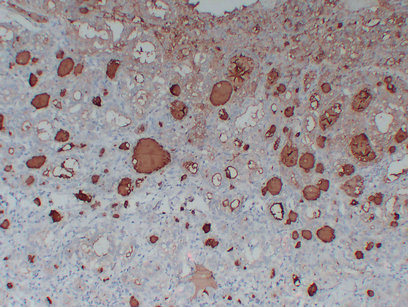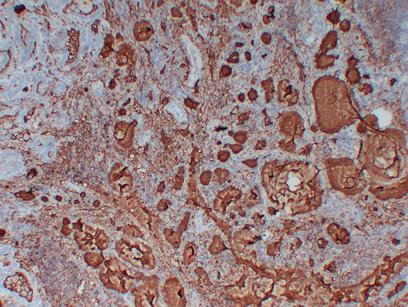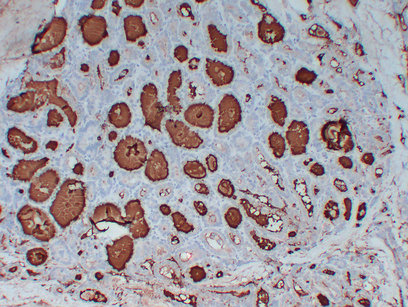Thyroglobulin (PT2174) mouse mAb
- Catalog Number : A130247
- Number :
-
Size:
Qty : - Price : Inquiry
Introduction
Specificity:This antibody detects endogenous levels of human Thyroglobulin. Heat-induced epitope retrieval (HIER) Citrate buffer of pH6.0 was highly recommended as antigen repair method in paraffin section.
Background:thyroglobulin(TG) Homo sapiens Thyroglobulin (Tg) is a glycoprotein homodimer produced predominantly by the thryroid gland. It acts as a substrate for the synthesis of thyroxine and triiodothyronine as well as the storage of the inactive forms of thyroid hormone and iodine. Thyroglobulin is secreted from the endoplasmic reticulum to its site of iodination, and subsequent thyroxine biosynthesis, in the follicular lumen. Mutations in this gene cause thyroid dyshormonogenesis, manifested as goiter, and are associated with moderate to severe congenital hypothyroidism. Polymorphisms in this gene are associated with susceptibility to autoimmune thyroid diseases (AITD) such as Graves disease and Hashimoto thryoiditis. [provided by RefSeq, Nov 2009]
Function:
Disease: Defects in TG are a cause of some forms of goiter [MIM:188450]. Goiter is an enlargement of the thyroid gland. This is sometimes linked to hypothyroidism.
Disease: Variations in TG are associated with susceptibility to autoimmune thyroid disease type 3 (AITD3) [MIM:608175]. AITDs including Graves disease (GD) and Hashimoto thyroiditis (HT), are among the most common human autoimmune diseases. They are complex diseases, which are caused by an interaction between susceptibility genes and nongenetic factors, such as infection.
Function: Precursor of the iodinated thyroid hormones thyroxine (T4) and triiodothyronine (T3).
PTM: Sulfated.
Similarity: Belongs to the type-B carboxylesterase/lipase family.
Similarity: Contains 11 thyroglobulin type-1 domains.
Subunit: Homodimer.
Tissue specificity: Thyroid gland specific.
Subcellular Location:Cytoplasmic
Background:thyroglobulin(TG) Homo sapiens Thyroglobulin (Tg) is a glycoprotein homodimer produced predominantly by the thryroid gland. It acts as a substrate for the synthesis of thyroxine and triiodothyronine as well as the storage of the inactive forms of thyroid hormone and iodine. Thyroglobulin is secreted from the endoplasmic reticulum to its site of iodination, and subsequent thyroxine biosynthesis, in the follicular lumen. Mutations in this gene cause thyroid dyshormonogenesis, manifested as goiter, and are associated with moderate to severe congenital hypothyroidism. Polymorphisms in this gene are associated with susceptibility to autoimmune thyroid diseases (AITD) such as Graves disease and Hashimoto thryoiditis. [provided by RefSeq, Nov 2009]
Function:
Disease: Defects in TG are a cause of some forms of goiter [MIM:188450]. Goiter is an enlargement of the thyroid gland. This is sometimes linked to hypothyroidism.
Disease: Variations in TG are associated with susceptibility to autoimmune thyroid disease type 3 (AITD3) [MIM:608175]. AITDs including Graves disease (GD) and Hashimoto thyroiditis (HT), are among the most common human autoimmune diseases. They are complex diseases, which are caused by an interaction between susceptibility genes and nongenetic factors, such as infection.
Function: Precursor of the iodinated thyroid hormones thyroxine (T4) and triiodothyronine (T3).
PTM: Sulfated.
Similarity: Belongs to the type-B carboxylesterase/lipase family.
Similarity: Contains 11 thyroglobulin type-1 domains.
Subunit: Homodimer.
Tissue specificity: Thyroid gland specific.
Subcellular Location:Cytoplasmic
General Information
| Reactivity | Human |
|---|---|
| Application | IHC |
| Host | Mouse |
| Clonality | Monoclonal |
| Conjugate | Non-conjugated |
| Uniprot | P01266 |
| Isotype | IgG1, Kappa |
| Immunogen | Synthesized peptide derived from human Thyroglobulin |
| Assay principle | IHC-p 1:100-500 |
| Sample type | paraffin section |
| Purity | The antibody was affinity-purified from mouse ascites by affinity-chromatography using specific immunogen. |
| Expression region | Brain,Thyroid |
| Storage buffer | Liquid in PBS containing 50% glycerol, 0.5% BSA and 0.02% sodium azide. |
| Storage instruction | -20°C/1 year |
| Research topic | response to molecule of bacterial origin, response to pH, response to bacterium, response to abiotic stimulus,response to organic substance, regulation of hormone levels, vesicle-mediated transport, response to lipopolysaccharide, hormone metabolic process, hormone biosynthetic process, transcytosis, |
| Alias | TG |











.png)